

How to Make Reading Fun. Getty Images Since Anita Lavine's daughter, Faye, had been an early and avid reader, the Seattle mom figured her 5-year-old son, Owen, would follow suit.
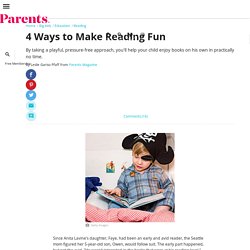
The early part happened, but not the avid. "He wasn't interested in the books that were at his reading level," says Lavine. So she brainstormed creative ways to help him practice his new skills, like reading the back of his favorite cereal box, learning the names of familiar birds in a Pacific Northwest nature guide, and flipping through family cookbooks for cool recipes. "Kindergarten and first grade lay the foundation for how kids feel about books throughout their education," says Annemarie B.
Words for Life - Home. Grammar, Punctuation and Spelling made easy. Grammar, Punctuation and Spelling made easy What is the English grammar, punctuation and spelling test at the end of Year 6?
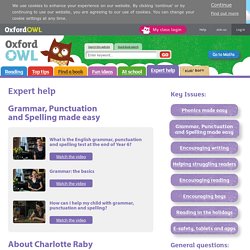
Watch the video Grammar: the basics Watch the video How can I help my child with grammar, punctuation and spelling? Books and Articles by Stephen D Krashen. The Power of Reading - Stephen Krashen. Journals - ALEA - Australian Literacy Educators' Association. ReadAloud_info-2. Kids and Family Reading Report. Full Report Infographics Past Reports 2010 Kids & Family Reading Report (PDF) 2012 Kids & Family Reading Report (PDF)
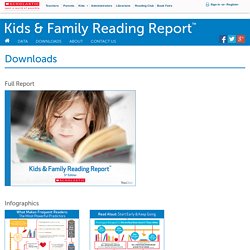
Study Finds Reading to Children of All Ages Grooms Them to Read More on Their Own. Photo Cue the hand-wringing about digital distraction: Fewer children are reading books frequently for fun, according to a new report released Thursday by Scholastic, the children’s book publisher.

In a 2014 survey of just over 1,000 children ages 6 to 17, only 31 percent said they read a book for fun almost daily, down from 37 percent four years ago. There were some consistent patterns among the heavier readers: For the younger children — ages 6 to 11 — being read aloud to regularly and having restricted online time were correlated with frequent reading; for the older children — ages 12 to 17 — one of the largest predictors was whether they had time to read on their own during the school day.
The finding about reading aloud to children long after toddlerhood may come as a surprise to some parents who read books to children at bedtime when they were very young but then tapered off. If we stop telling kids what to read, they might start reading again. A rain shower sends Maynard Elementary School kindergarten student Maya Roby to shelter during a literacy program in Knoxville, Tenn.
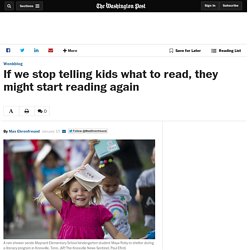
(AP/The Knoxville News Sentinel, Paul Efird) As a treat for Hanukkah last month, Sandra Stotsky took her grandchildren to the New England Mobile Book Fair in Newton, Mass. They were wandering around aimlessly. The store in a suburb of Boston has 32,000 sq. ft, of books, but the kids had no favorite authors, nothing they'd been longing to read.
Stotsky, a self-described "professional Jewish grandmother," had plenty of suggestions. Theconversation. Reading instruction in the classroom is a key concern for all teachers and there are many ways to go about it.

However, is our determination to achieve excellence in reading skills in our children killing their love and enjoyment of a good book? In my work with parents, I am frequently asked the best ways to encourage and motivate reluctant readers to be engaged with books. Parents report that their children return home from school with no inclination to pick up a book and read.
Any avid reader will gladly talk about the joy of curling up with a good book to read away the hours on a cold, rainy afternoon. Reading a good book is one of life’s greatest pleasures. Ditch the home readers – real books are better for your child. As school resumes for the new year, the “home reader” routine for primary school children also recommences.
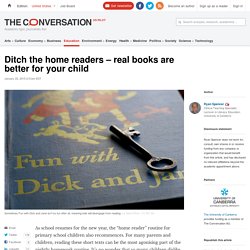
For many parents and children, reading these short texts can be the most agonising part of the nightly homework routine. It’s no wonder that so many children dislike reading their home reader. These books are often mass-produced, boring texts that hold little excitement or mystery. Frequently, they are the same book that your child has read before, either in class or as a previous week’s home reader.
However, parents brave the battle of reading these books every night as we all understand that learning to read takes practice. Theconversation. Engaging boys in reading can be tough.
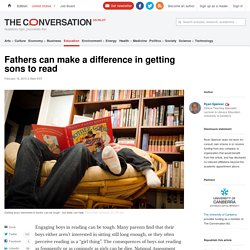
Many parents find that their boys either aren’t interested in sitting still long enough, or they often perceive reading as a “girl thing”. The consequences of boys not reading as frequently or as copiously as girls can be dire. How Children Learn To Read. Why is it easy for some people to learn to read, and difficult for others?
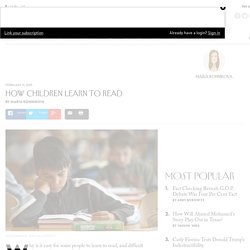
It’s a tough question with a long history. We know that it’s not just about raw intelligence, nor is it wholly about repetition and dogged persistence.